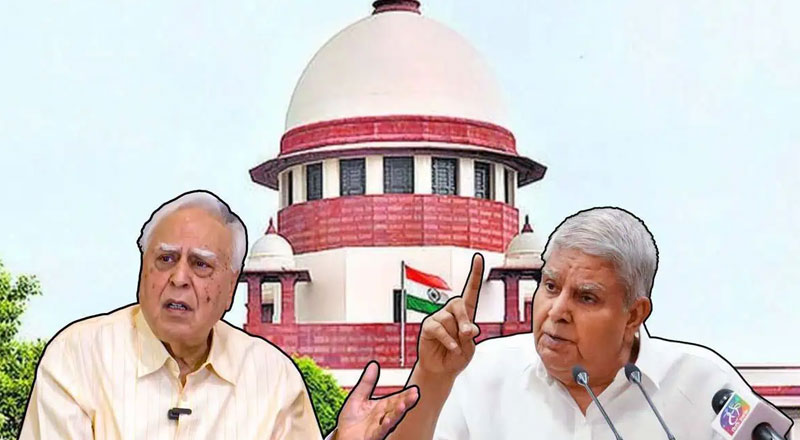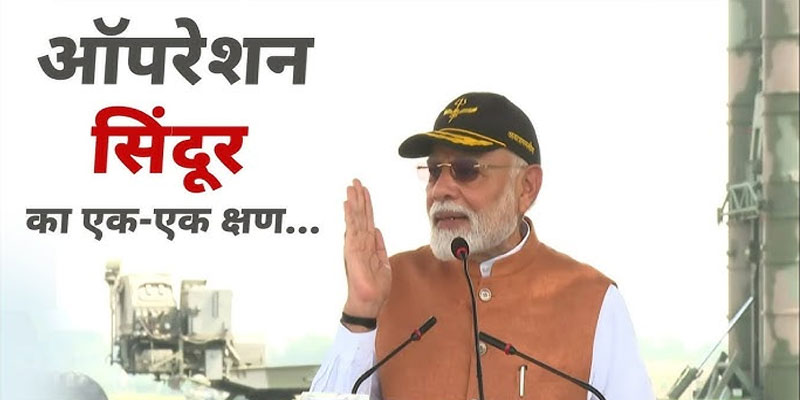Judiciary vs Executive: A Tense Constitutional Flashpoint
India’s constitutional framework was jolted once again by a sharp war of words between the executive and the judiciary. The trigger this time? A recent Supreme Court ruling that set a three-month deadline for the President of India to act on bills forwarded by state governors. The verdict, intended to streamline legislative processes and prevent indefinite stalling of bills, has sparked a political and legal storm, bringing to the fore long-standing tensions between the judiciary and executive authorities.
Vice President Jagdeep Dhankhar, who also chairs the Rajya Sabha, lashed out at the verdict, accusing the Supreme Court of overstepping its mandate and acting like a “Super Parliament.” His remarks prompted a swift and scathing rebuttal from senior advocate and Congress MP Kapil Sibal, who defended the court’s role and underscored the constitutional limits of executive authority.
The Verdict That Sparked a Political Firestorm
The Supreme Court’s recent directive mandates that the President must respond to bills sent by state governors within a three-month time frame. This move aims to prevent legislative gridlock—a concern increasingly voiced by state governments, particularly those governed by opposition parties, where governors have been accused of sitting indefinitely on key legislation.
The court’s judgment was rooted in the principle that delays in constitutional duties erode democratic function. By setting a time-bound framework, the bench—comprising two judges—sought to uphold the legislative will and prevent executive overreach by unelected constitutional authorities.
VP Dhankhar: “Judiciary Acting Like Super Parliament”
At an event with Rajya Sabha interns, VP Jagdeep Dhankhar voiced deep concern over the court’s decision, saying it set a dangerous precedent. “Judges are now legislating, performing executive functions, and acting like a Super Parliament,” he said. Dhankhar also questioned the authority of a two-judge bench to issue such directives to the President, arguing that only a five-judge Constitution Bench is authorized under Article 145(3) to interpret substantial questions of law.
“There is a directive to the President. Where are we heading? We never bargained for this kind of democracy,” Dhankhar remarked, suggesting the court’s decision lacked proper constitutional backing and accountability.
Sibal Fires Back: “President Has No Personal Authority”
Kapil Sibal, addressing a press conference, slammed Dhankhar’s comments as constitutionally flawed and politically motivated. “The President is only a titular head and acts solely on the advice of the Council of Ministers. There is no personal discretion involved. Dhankhar ji should know this,” Sibal said emphatically.
He defended the Supreme Court’s right to intervene when constitutional duties are being neglected. “If the executive is not doing its job, the judiciary must step in. That is not judicial overreach—it’s a safeguard of democracy,” he asserted.
Sibal also warned against vilifying the judiciary whenever its rulings don’t align with government interests. “Whenever decisions don’t suit those in power, suddenly the court is accused of crossing limits. But Article 142 gives the Supreme Court the power to ensure complete justice,” he pointed out.
Critique of Executive Double Standards
Drawing on historical precedent, Sibal reminded Dhankhar that Justice Krishna Iyer’s 1975 verdict unseating Indira Gandhi came from a single-judge bench. “That was acceptable then? But now a two-judge verdict is questioned simply because it challenges the current power structure?” he asked.
He also rebuked Union Ministers Arjun Ram Meghwal and Kiren Rijiju, accusing them of echoing a narrative that attempts to undermine judicial authority. “Meghwal talks about staying within limits, Rijiju questions the court’s role—what limits are they referring to? Limits that prevent checks on executive power?”
Sibal stressed that governors withholding bills indefinitely amounts to an intrusion on legislative supremacy, and called for greater accountability within the executive, not less.
Reading the Fault Lines: A Battle Over Constitutional Boundaries
This escalating conflict is not merely about a court ruling—it’s about competing visions of constitutional power. On one hand, the judiciary seeks to uphold democratic process by ensuring that the legislative intent is not obstructed by unelected authorities. On the other, top figures within the executive—including the Vice President—are pushing back against what they see as judicial activism.
Dhankhar’s argument that such rulings require a five-judge bench under Article 145(3) may hold procedural weight. However, Sibal’s rebuttal emphasizes that not all judicial directives require constitutional interpretation—some are issued to uphold the spirit of the Constitution, especially when democratic processes are at risk of being undermined.
A Constitutional Tussle with Broader Implications
The showdown between Jagdeep Dhankhar and Kapil Sibal reflects a deepening tension between institutions in India’s democracy. At the heart of the issue is a simple question: Who ensures accountability when constitutional authorities delay action or neglect duty?
The Supreme Court’s ruling is not just a legal directive—it’s a political statement about the need for timely governance. And while Dhankhar warns of judicial overreach, critics like Sibal argue that executive inaction is a greater threat to democratic functioning.
In a democracy, balance between branches is essential. That balance is not disturbed when the judiciary acts to fill a vacuum—it is disturbed when one arm seeks to insulate itself from scrutiny. The unfolding episode is a stark reminder that institutional respect must be mutual, and that the Constitution cannot be selectively upheld depending on who holds power.
(With inputs from agencies)





